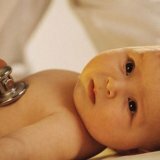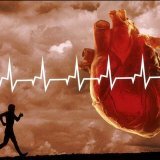10 main measures for the prevention of cardiovascular diseases
- Healthy food .Means the reduction in the daily diet of fatty and fried foods, confectionery fats, caffeine, salt, sugar, chicken eggs, and the introduction of sea fish, poultry meat of low-fat varieties( without skin), legumes, whole grains, vegetables, fruits and berries.
- Fighting overweight .All people should watch their weight, when it increases, observe a low-calorie diet and exercise.
- Fighting the hypodynamia of .Hiking in the fresh air, exercise and exercise with adequate load, refusing to use the car or elevator often - all this reduces the risk of heart and vascular pathologies.
- Discarding bad habits of .It implies self-abandonment of smoking, alcohol, drugs, or getting rid of these addictions through special treatment.
- Stress Management .Ability to respond adequately to minor dislocations, pleasant communication with like-minded people and hobby, correct mode of work and rest, normal sleep, music therapy and the intake of natural sedatives - all these measures will reduce the number of stressful situations.
- Self-monitoring of blood pressure and its timely reduction .It implies the regular measurement of BP according to the recommendations of the European Society of Cardiology or when there are disturbing symptoms, the systematic admission of antihypertensive drugs prescribed by the doctor.
- Systematic preventive examination .People who are at risk for developing cardiac and vascular pathologies, or who notice an increase in blood pressure in an independent measurement, should visit the doctor in a timely manner, carry out his recommendations and conduct preventive examinations( measurement of blood pressure, pulse, ECG, Echo-CG, blood tests, etc.)..).
- Regular blood cholesterol level control .All people over 30 years of age must take an annual test to determine the level of cholesterol in the blood.
- Regular monitoring of blood sugar level .People after 40-45 years should take a blood test for sugar every year.
- Taking medications for dilution of blood .Implies the appointment of cardiologist assigned funds for dilution of blood by people who are at risk for the development of cardiac and vascular pathologies.
Heart and vascular disease has become the number one problem worldwide. Think about it! Every year in Russia, due to the pathologies of the cardiovascular system, 1 million 300 people die! And, unfortunately, Russia is one of the leaders in these indicators.55% of deaths in the country are due to pathologies of the heart and blood vessels!
Contents
- 1 1. Healthy food
- 2 2. Fighting excess weight
- 3 3. Fighting with hypodynamia
- 4 4. Refusing bad habits
- 5 5. Fighting with stress
- 6 6. Self-monitoring of blood pressure and its timely reduction
- 7 7. Systematic preventive examination
- 8 8Controlling blood cholesterol level
- 9 9. Controlling blood sugar level
- 10 10. Taking blood thinning medications
1. Healthy food
The state of the vessels and heart is significantly affected by the composition of the daily diet. Frequent and excessive consumption of fatty and fried foods, coffee, chicken eggs, salt and sugar is a sure way to worsen the state of blood vessels and the development of heart attacks, strokes, hypertension and other dangerous ailments.
Increased content of saturated fats, caffeine, salt and sugar increases the level of "harmful" cholesterol and sugar in the blood. Under their influence on vascular walls formed calcified with time atherosclerotic plaques. There is a narrowing of the lumen of the vessels, leading to their wear and tear. This factor increases the load on the heart, develops hypertension. Hypertension, in turn, leads to the development of many serious diseases that can lead to disability and death.
Useful for heart and blood vessels:
- sea fish;
- poultry meat;
- vegetable oils;
- cereals;
- beans;
- vegetables, fruits and berries.
Harmful to the heart and blood vessels:
- fatty meat;
- confectionery fat;
- sugar and products with it;
- chicken eggs( no more than 1-2 per week);
- coffee( no more than 1 cup per day).
Read more: Products useful for the heart and blood vessels
2. Fighting excess weight
Obesity always increases the risk of vascular and cardiac pathologies - every 10 kg extra can increase blood pressure by 10-20 mm Hg. Art. All people need to be weighed regularly and measure the abdominal circumference to determine abdominal obesity.
Indicators of the norm:
- body mass index( according to Quetelet) - up to 28,0;
- waist circumference - up to 88 cm in women, up to 102 cm in men.
If these values are exceeded, a low-calorie diet should be followed and be physically active.
See: Calculator for calculating body mass index.
3. Control of the hypodynamia
Hypodinamy is one of the common causes of heart and vascular disease. This is confirmed by the facts about the low physical activity of citizens and elderly people.
Physical education and frequent outdoor activities will allow:
- to activate blood circulation( see "Products that improve blood circulation");
- strengthen myocardium and vessel walls;
- accelerate the withdrawal of "harmful" cholesterol;
- saturate body tissues with oxygen;
- normalize metabolic processes.
4. Discarding the bad habits of
All studies on the effects of smoking, alcohol and drugs point to one indisputable fact - the rejection of these bad habits makes it possible to reduce the risk of heart and vascular diseases tenfold. The receipt of these toxic substances in the body leads to the following consequences:
- increase in blood pressure;
- arrhythmia development;
- increased heart rate;
- obesity;
- increase in the level of "harmful" cholesterol;
- development of atherosclerosis;
- fatty infiltration and toxic damage to the heart muscle;
- deterioration of the myocardium and vessel walls.
Read on: "Scientists have refuted the harm of nicotine and talked about the safe way of smoking".
If you can not get rid of addiction yourself, you should use the following methods to avoid harmful habits:
- for quitting smoking - acupuncture, nicotine patches or chewing gums, hypnosis, author's methods Zhdanov, McKenna, Carra, Shichko, etc.;
- for the refusal of alcohol or drug addiction is a course of treatment and rehabilitation for a professional narcologist.
5. Struggling with stress
Frequent stressful situations lead to the deterioration of blood vessels and myocardium. During the nervous surge, the level of adrenaline rises. In response to his influence, the heart begins to beat faster, and the vessels are crammed with spasm. As a result, a jump in blood pressure occurs, and the myocardium wears out much faster.
Resistance to stress can be as follows:
- is more likely to be outdoors or outdoors;
- learn not to react violently to minor trouble or household difficulties;
- to observe a mode of work and rest;
- get enough sleep;
- receive positive emotions from hobbies and communication with friends or loved ones;
- listening to relaxing classical music;
- with nervousness take sedatives based on herbs.
6. Self-monitoring of blood pressure and its timely reduction
According to statistics in Russia due to hypertension, about 100 thousand people die. Increased blood pressure leads to the development of IHD, heart attacks, strokes and other pathologies of the heart and blood vessels. That is why all people should regularly monitor pressure indicators.
The European Society of Cardiologists recommends measuring blood pressure at the following frequency:
- if at the first measurement the indicators are below 140/90 - persons not in the risk group are measured once a year, persons at risk are measured 3 times a year;
- if at two measurements the indicators 140-180 / 90-105 - measure at least 2 times a month;
- if at two measurements the indices of 180 and above / 105 and above are measured daily and only against the background of the initiated antihypertensive therapy.
The reason for mandatory unplanned BP measurement may be such signs:
- headache or dizziness;
- tinnitus;
- breathing difficulty;
- "flies" before the eyes;
- severity or pain in the chest or heart.
If the elevated indicators of blood pressure are detected, the method for reducing it with medications should be selected by the doctor.
7. Systematic preventive examination
A planned preventive examination and timely visit to the cardiologist should become the norm for people at risk for the development of cardiac and vascular pathologies. The same applies to individuals who report an increase in blood pressure in an independent measurement. Do not neglect your doctor's advice!
The regular survey plan may include the following activities:
- listening to heart sounds;
- measurement of blood pressure and pulse;
- tests for cholesterol and blood sugar;
- ECG;
- ergometry;
- Echo-KG;
- MRI;
- MRA.
Which of them do you need? Define the doctor.
8. Controlling blood cholesterol level
It is necessary to begin to monitor the cholesterol level in the blood every year after 30 years. In healthy people, its level should not exceed 5 mmol / l, and in patients with diabetes mellitus - 4-4.5 mmol / l.
9. Controlling blood sugar level
It is necessary to start to monitor blood sugar level after 40-45 years. Its level should not exceed 3.3-5.5 mmol / l( in the blood from the finger), 4-6 mmol / l( in the blood from the vein).
10. Taking medications for dilution of blood
For people at risk, a cardiologist can recommend the use of blood thinners. The choice of the drug, its dose, the duration of the course of admission is determined only by the doctor, guided by the data of the analyzes and other surveys.
Compliance with these rules for the prevention of cardiovascular disease will significantly reduce the risk of their development. Remember this, and be healthy!
Cardiologist Petrova Yu.
Recommended for viewing:



